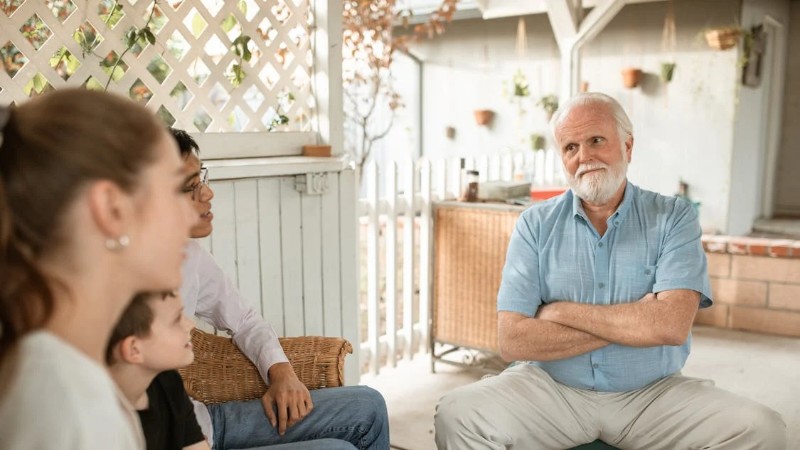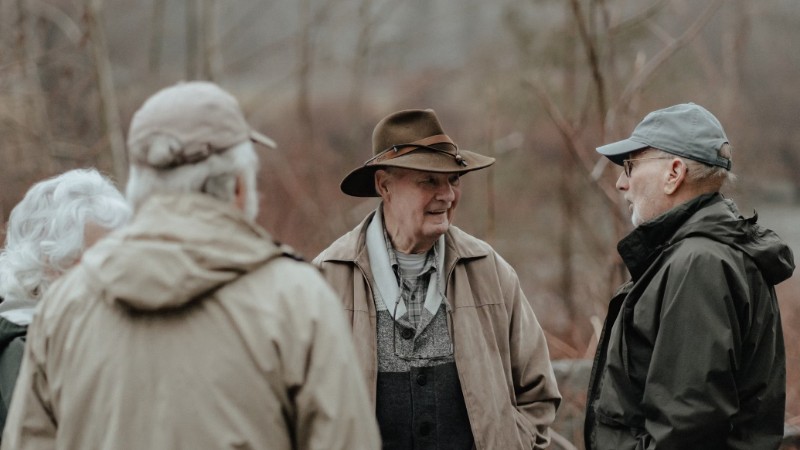Staying connected with friends, family, and the community is crucial for well-being, health, and happiness as people get older. Maintaining close relationships not only helps seniors feel happier, but it also has real health benefits.
Regular social engagement can help older adults stay mentally sharp, improve their emotional well-being, and even strengthen their physical health.
Studies indicate that socializing helps slow memory decline and lowers dementia risk in seniors. Research suggests that seniors who regularly connect with others maintain their cognitive skills for longer periods. However, nearly half of people over 60 are at risk of becoming socially isolated, and one-third are likely to experience some level of loneliness as they age.
Simply put, interacting with others keeps the brain active and creates new mental connections, which can help delay cognitive aging. When seniors participate in conversations, play games, or work on projects with others, it exercises the brain in many ways.
Key Takeaways
Staying connected with friends, family, and the community is crucial for well-being, health, and happiness as people get older.
- Regular social engagement can help older adults stay mentally sharp, improve their emotional well-being, and even strengthen their physical health.
- Social activities require thinking, listening, and problem-solving, all of which help build mental resilience and reduce the risk of age-related cognitive decline.
- A strong network of friends, family, or caregivers is vital for a senior’s overall well-being, providing emotional support, comfort, and assistance with daily tasks.
Benefits of staying connected
Social activities require thinking, listening, and problem-solving, all of which help build mental resilience. Seniors who stay socially active have better memory and attention over time compared to those who are more isolated.
Social interaction positively impacts mental health, too. Engaging in meaningful conversations and spending time with friends or family can lift a person’s mood, lower stress, and build a more positive outlook on life. Social ties also help older adults cope better with tough times, like dealing with illness or loss.
Being part of a social group provides comfort, helps reduce anxiety, and boosts self-esteem. The simple act of connecting with others can give seniors a sense of purpose and belonging, both essential for emotional well-being.
Finding purpose in community involvement
Community centers, local clubs, and social groups offer seniors great ways to connect. Many communities have programs that match seniors’ interests, from exercise classes and book clubs to arts and crafts. Joining these activities helps seniors meet people with similar hobbies, creating a friendly environment where they feel welcomed and valued.
Participating in community activities also allows seniors to stay engaged in society and gives them a chance to contribute. For example, many older adults find purpose in volunteering, which has both personal and community benefits. Studies show that seniors who volunteer experience improved physical health, lower stress, and increased life satisfaction.
Programs like AmeriCorps Seniors give older adults a platform to share their skills with communities that need help. Spending just a few hours a week volunteering can improve physical abilities and emotional health, and it also lowers the risk of depression.
Through volunteering, seniors not only build relationships but also experience a sense of purpose, which adds meaning to their lives. They can also develop new friendships and maintain mental sharpness through group activities and projects that encourage collaboration and problem-solving.
Lifelong learning opportunities
Learning doesn’t have to stop with age. In fact, group learning activities are another effective way for seniors to stay mentally active. Many community centers offer classes tailored to seniors, covering topics like technology, history, and even cooking. These classes help seniors stay mentally alert, encourage curiosity, and provide a chance to socialize with others interested in the same subjects.
Participating in lifelong learning helps prevent feelings of loneliness, sadness, and worry. It allows seniors to stay informed, connect with others, and find joy in discovering new topics. This mental engagement is essential for maintaining emotional well-being and reducing the risk of age-related cognitive decline.
Beyond in-person learning, technology offers seniors even more ways to connect and stay engaged. Tools like Zoom, Skype, and FaceTime allow seniors to have video chats with family members, no matter the distance. By using social media, seniors can also keep up with their friends’ and families’ lives, which helps them feel closer and stay involved.
Digital tools open up more opportunities for social engagement. Seniors who know how to use these tools can participate in online events, join virtual discussion groups, or attend digital classes. These interactions, whether in-person or online, provide a way to feel connected, reducing isolation and loneliness.
Importance of social support
A strong network of friends, family, or caregivers is vital for a senior’s overall well-being. Supportive relationships help seniors handle challenges, whether it’s a health issue or loss of independence. Emotional support from others reduces stress and provides comfort, helping older adults manage physical and mental health issues like diabetes, heart disease, or anxiety.
Family members, friends, or professionals such as caregivers can offer assistance and companionship, which can improve seniors’ mental and emotional well-being. Having someone to talk to regularly can reduce the risk of depression, keep anxiety at bay, and improve overall happiness.
Outside the family and friends, organizations and community programs also play a key role in supporting older adults. Community centers and senior organizations provide services like meals, transportation, and social gatherings, all of which help seniors live more independently. These services reduce the burden of daily living, allowing seniors to focus on activities that bring them joy and improve their well-being.
Programs like Meals on Wheels, volunteer transportation services, or home repair assistance allow seniors to maintain their quality of life without worrying about daily tasks. These community resources support seniors in staying active, independent and connected to their community.
How to encourage social engagement
Family members and caregivers can help seniors stay socially active by arranging activities and offering transportation to events. They can assist with finding local activities that match the senior’s interests, whether it’s joining a book club, attending a concert, or going to a fitness class. By spending time together, caregivers and loved ones can also offer emotional support and companionship.
Encouraging seniors to engage in community activities fosters a sense of purpose and strengthens social bonds. This involvement supports both their mental and physical health, helping them feel more fulfilled and happy in their later years.
For seniors, friendships and community involvement make life more rewarding. Being part of a social network helps combat loneliness, enriches everyday experiences, and provides a support system in times of need. Whether it’s through volunteer work, learning groups, or social events, forming connections makes a positive difference in a senior’s life.
Conclusion
Staying socially active is crucial for seniors’ health and happiness. Ongoing social interaction can prevent feelings of isolation, lower the risk of depression, and keep seniors mentally sharp. Community involvement provides essential support, offering services and opportunities that enhance quality of life.
Programs that encourage social participation have a profound impact, creating opportunities for seniors to connect, grow, and contribute. By engaging in meaningful social activities, seniors can enjoy improved mental and physical health, experience less cognitive decline, and build a strong sense of purpose.
Through these connections, older adults can continue living fulfilling lives with dignity, independence, and joy.



